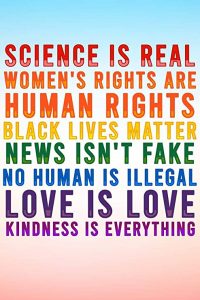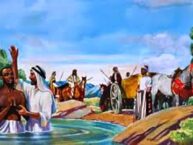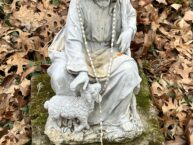 September 13, 2020: May God’s words be spoken, may God’s words be heard. Amen.
September 13, 2020: May God’s words be spoken, may God’s words be heard. Amen.
As I was writing this sermon, I kept seeing the sights and sounds of the week against the backdrop of the scriptures, and my heart broke. The picture of a boy who was found holding on to his dog as they died trying to escape the flames of the wildfires, the sound of booing breaking through a moment of silence for those suffering under the sin of racism, the weeping of a nation as more are killed by COVID-19, and the pain in the streets of our towns and cities as we mourn those lost to hate. These were what came into my heart as I prayed over these scriptures for today, and in them, I found strength, and I pray you do too.
And so, here we are in the Exodus story, and the people, having survived the 10th plague on that first Passover that we talked about last week, are now crossing on dry land through the sea waters that God had parted by Moses’s hand. The Egyptian soldiers of Pharaoh’s army, their chariots, and the horses were not so fortunate. Once the Israelites were safe, God commanded Moses to move his arms to bring down the sea walls on them all – drowning every single one.
Now, as one who loves animals, and really all of God’s beautiful creation, I never really liked this part. I mean, what did those poor horses do, or for that matter, the innocent children killed in the 10th plague. Yet if we remember, as I said last week, that this was about the mythic battle of a divine God vs. a God of earthy origin – the Pharaoh, then we come to see what really happened here, and is still happening even today. Because throughout history, whenever a leader of a people begins to value power over the welfare of their people, whenever a leader of a people takes on a God-like status among his or her followers, whenever a leader of a people rules by violence and oppression rather than with empathy and love for those they are called to serve, innocents will suffer, and eventually the regime will collapse upon itself, drowning under the weight of its own greed. The Gods of our own making will always destroy us, or nearly so, as the Israelites themselves will learn when raise up a golden calf – really a bull – to worship. Now, I wonder where else we have seen a large metal bull? Hmmmm….
We don’t need no bull to see the Pharaoh’s today, do we?
For it is all too clear in the nearly 200,000 dead from COVID-19 because our national leaders valued Wall Street over Main Street, the wildfires destroying human lives, animals, and forest across the West Coast because climate change deniers continue to block all efforts to change our foolish ways, the rise of white nationalist groups who are now the number one domestic terrorist threat wreaking violence and hate across our streets because they are emboldened under the rise of populist nationalism in this and other countries, the suffering of people under the rising levels of poverty because of the greed of others… These are those who suffer under the earthly Gods of power, greed, hate, selfishness, and pride. And we cry out to the one true God for deliverance.
Yet, Israel’s deliverance was a partnership with God. God worked through the very human Moses. The people had to trust both Moses and God to take those very scary steps on the dry land between those walls of water. That’s the way it is with God. Justice for God’s creation is in partnership with that very creation. We have a part to play in it all.
But before we go too far past this epic moment (and you know you are all thinking about the Charlton Heston version, right?), there is a cautionary tale here for the Israelites, and for us too. On the surface, especially in the songs and scriptures that praise the destruction of Pharaoh’s army, this episode takes on a right v. wrong, good v. evil kind of tone, which if left unchecked, as it often is, becomes us v. them. And that, my friends, is how God’s, the earthly Pharaoh kind, are born.
This is what St. Paul was warning about in the passage we heard this morning from his epistle to the Romans. Last week, in the passages just before what we heard today, St. Paul wrote that love is the fulfilling of God’s law, and that love does no wrong to a neighbor. And so here, he addresses what is happening in the communities of The Way, the early church, to whom he is writing, who clearly are having quarrels over how this new faith of theirs was to be followed. Paraphrasing here, he basically is saying “Now look, God welcomes everybody. It doesn’t matter if they are vegetarians, or meat and potato folks – on a gluten free or South Beach diet – really, stop the finger pointing already. The only thing you need to be concerned about is that they honor God in whatever they do, and that you love one another. Get off your pedestal, ‘cause you ain’t God, and judgement is God’s alone.”
Now we might be thinking that’s kind of a silly thing to fight about – what people will or will not eat – but what if we were to change it to whether to stand or kneel at parts of the liturgy, or when to do the announcements during the service, or yikes – traditional Anglican choral music vs. a praise band? See, the thing is, these divisions have been a part of our faith from the beginning.
It always strikes me as odd that folks sometimes dream about us being a single church – all united again – you know, holding hands and singing kumbaya. Well, starting soon after that first Easter morning, we were divided and have been ever since – followers of different disciples going in different directions. So much so that Paul and Peter were practically engaged in an all out brawl over who eats what, when, and with whom (not to mention whether the guys have to go under the knife to be circumcised – a definite hindrance to the expansion of the faith to be sure). Then there was also the arguments around inclusion of non-Jews in the first place. As the leaders fought, so too their followers, which is what we are hearing about in today’s epistle.
Now for those who want to then judge “organized religion” – which is an oxymoron by the way, I mean seriously, have you ever seen my office or the preparations just before the Palm Sunday service? – anyway, for folks who think this is why no one should be a part of a faith community, there’s plenty of the same thing happening in the secular realm, so take St. Paul’s advice and don’t go there.
In other words, judging others leads to divisions of who’s in and who’s out, and it is this tribalism that is the foundation of earthly thrones, and walls that divide one people from another, and as we are all children of the same God, we are cutting off ourselves from our sisters and brothers, and God weeps. There will always be different paths to God, and the right one is the one you are on. Among each faith tradition, and within divisions of those faiths, somewhere you will find what draws you into the deepest relationship with your Creator. And that’s a good and joyful thing always and everywhere.
For me, that was the Episcopal Church, and one of the main reasons was the way in which we would agree to disagree, and still come to the table of Christ together. This via media, or middle way, founded in Aristotle, and instilled in our Anglican DNA since Elizabeth I, is essentially what St. Paul is calling for in his epistle to the Romans. While initially used to create unity between the Roman Catholic and Puritan wings of the early Church of England, it has helped us to love each other, even while having the most fundamental disagreements in our church – from the ordination of people of color, women, and LGBT people, to the blessing of same sex marriages, creation care, and policies around investment in the Middle East, we strive to listen to one another, to seek common ground, and if necessary, to build bridges of reconciliation when our church has been wounded in division. We do this because we know that as followers of Jesus, we are called into partnership with God and one another, not to sit in judgement and think ourselves as God.
Yet lest we think this non-judging love means we never stand for what is right and against what is wrong, we must remember that silence in the face of injustice, oppression, poverty, violence, or hate is also not the path for followers of Jesus, the one who cared for the sick, the outcast, the stranger, the poor, and the forgotten. The same Jesus who told us that when we serve the least of these, we serve him.
As followers of Jesus, we are not on this earth to build walls of division, but to build bridges of love.
We are not called to raise up earthly God’s of greed, but to bring them down.
We are not to be judges of others, but rather a voice for the voiceless, a defender of the outcast, and a friend to the stranger.
And we do all of this in partnership with God.
How do we know we are on the right path, and partnering with God, rather than pursuing the God’s of our own making?
How do we recognize the Pharaoh in our midst, or perhaps in our own heart?
St. Paul would tell you to go back a few lines in his letter and read his words again “Owe no one anything, except to love one another; for the one who loves another has fulfilled the law…Love does no wrong to a neighbor; therefore, love is the fulfilling of the law.” Jesus would remind you of his parting words to his disciples the night before he died for us “Love one another as I have loved you.”
So, the question for us to ask ourselves is “does what I am doing, or what I am witnessing, look like love?”
Is it love when we refuse to stand at the table of our Lord with those with whom we disagree about doctrine?
Is it love when we witness our black sisters and brothers being killed by police and do nothing, or worse, fight against those who protest?
Is it love when we refuse to listen to climate experts, continue to destroy our planet, while human and animal lives are lost?
Is it love when we continue to deny women equal protection in our society?
Is it love when we turn our backs on the stranger in our land, or worse – put them into cages?
Is it love when we marginalize our LGBTQ sisters and brothers?
Is it love when we think the way forward is to carry assault weapons into our streets, weapons that are meant for one purpose only – to kill people?
Is it love when we hate the republican or democrat, conservative or liberal, the ones on the left or the right?
Is it love when we cast aspersions against those who worship differently, or whose liturgical customs are as far away from ours as Mars is from Venus?
Is it love when we stay silent on the sidelines while others suffer from poverty, neglect, oppression, injustice, addiction, or illness?
Nobody said this love stuff was gonna be easy.
But we follow Jesus, who was willing to die on a cross for it.
What are you willing to do?
Because the answer to that question could mean the difference in your life between getting to the promised land, or drowning in a sea of your own making.
Choose love. Always choose love.
And when you find that you haven’t, and it will happen, because we are human, not God, then Christ’s call to forgiveness as we have been hearing in our gospel passages from last week and today, is our salvation.
That is why I am grateful for the confession each and every day.
Because the hardest person to forgive is usually yourself.
Particularly in the trying time of the pandemic. We think we have to be super-human and on 7×24. We are tired, we are worn, we are grieving. And that is when the stress can challenge our very souls and we will make poor choices.
So when that happens, when we come to a place of judging others, or judging ourselves, when we are not acting in love, or are too weary to fight the good fight, Jesus calls us to a place of forgiveness.
To ask forgiveness of others.
Forgive one another.
Forgive yourself.
For in those very acts, you put aside the anger that will destroy, and begin to walk in the love that gives life.
Then you will be ready once more to follow Jesus- loving God, and loving your neighbor as yourself.
Then there is not a Pharaoh, who by the grace of God, stands a chance against you.
Then you will find, by the direction of the Holy Spirit, your deliverance in the promised land.
Amen.
For the audio from the 10:30am service, click below, or subscribe to our iTunes Sermon Podcast by clicking here:
The Rev. Diana L. Wilcox
Christ Church in Bloomfield & Glen Ridge
September 13, 2020
Fifteenth Sunday After Pentecost – In A Time Of Separation
1st Reading – Exodus 14:19-31
Psalm 114
2nd Reading – Romans 14:1-12
Gospel – Matthew 18:21-35






